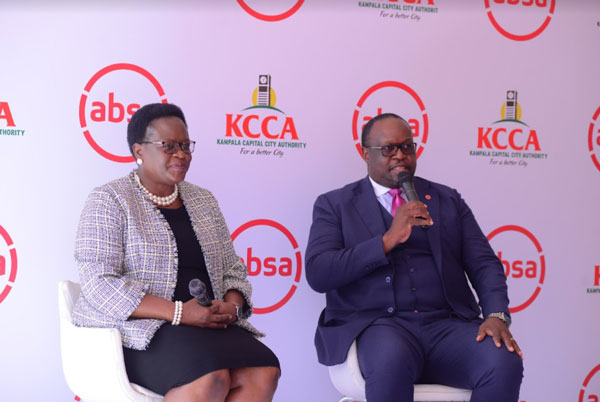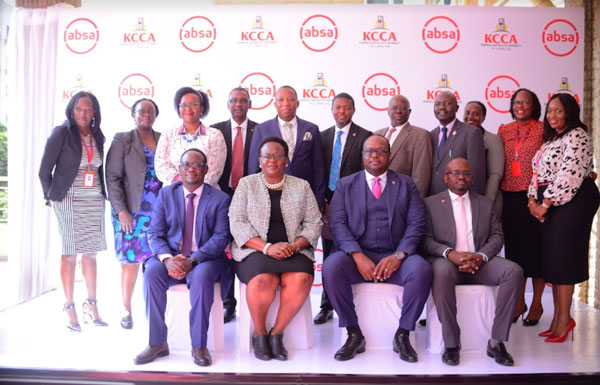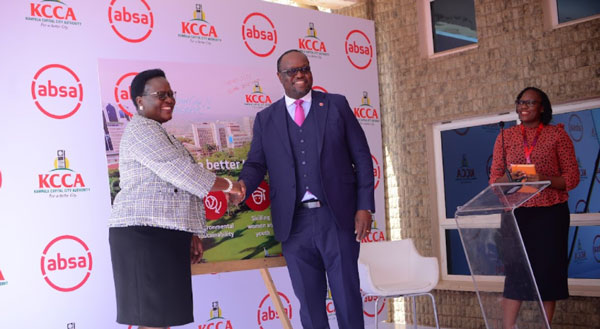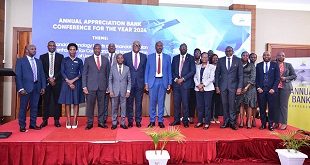
Kampala, Uganda | THE INDEPENDENT | Absa Bank Uganda has today announced a partnership with the Kampala City Council Authority (KCCA) focused on three areas of intervention, namely; supporting environmental sustainability, skilling of women & youth, and behavioural change communication.
The partnership is intended to run for three years, and Absa has earmarked a community investment worth UGX 490 million towards various initiatives under the areas of focus.
“Kampala is the 13th fastest growing city in the world, contributes 80% of Uganda’s industrial and commercial activities and delivers over 65% of the national GDP with a daytime population of an estimated 4 million people. The city’s urbanization rate of over 5% is resulting in the fast depletion of green cover. Through this partnership, we will support KCCA’s efforts to increase Kampala’s tree density in the various municipalities with an 80% survival rate of trees planted, establish efforts towards economic empowerment for women and youth and invest towards communications that promote changes in knowledge, attitudes, norms, beliefs and behaviours to support the evolution towards the smart city agenda,” said Mumba Kalifungwa, Managing Director, Absa Bank Uganda.
The partnership was launched between Absa Bank and KCCA at the Absa Head office in the presence of the KCCA leadership, led by Dorothy Kisaka, the KCCA Executive Director.
“This partnership will strengthen the initiatives established by KCCA towards a smart sustainable city as articulated in our strategic plan. We appreciate the initiatives under this partnership that will support our vision of a vibrant, attractive and sustainable city,” said Dorothy Kisaka, the KCCA Executive Director.
According to KCCA, 20% of Uganda is urban. Despite Uganda being one of the least urbanized countries in Africa, it has one of the fastest urbanising rates at 5.2%, and hence Kampala is one of the world’s fastest-growing cities.


Kampala’s high rate of urbanization has also presented several challenges including loss of wetland biodiversity, destruction of habitats, and deterioration of water quality, and has largely impeded natural drainage patterns of the landscape leading to frequent floods in most urban centres, including Kampala.
“As a financial institution, we are cognizant of the large array of societal challenges facing us including economic development, job creation, quality education and the impact of climate change. Through this partnership, we will contribute towards the mitigation of the negative effects of climate change and support the sustainable growth of the city’s people – helping them earn sustainable livelihoods,” Kalifungwa added.
The city also has a high number of informal sector enterprises mainly involved in trade, transportation, manufacturing and construction.
“We continuously promote innovative approaches to economic empowerment with a special focus on groups that are economically disenfranchised such as women and youth. I am pleased to announce that under this partnership, Absa has committed to supporting youth skilling to increase youth employability and supporting job creation, supporting enterprise development for women and youth-led businesses and providing financial literacy to these groups. A significant proportion of the economic activity within Kampala is within the informal sector and we are in support of efforts to see them grow and thrive,” Ms Kisaka added.
According to data from KCCA, over 80% of the trees in the city are foreign tree species, resulting in a low survival rate. Through this partnership, Absa will boost KCCA’s efforts to plant indigenous trees, especially fruit trees that have a greater chance of survival within the community.
During her remarks, the KCCA ED remarked that current efforts towards sustainability will remain in vain without the support of city dwellers.
“Behavior change is important because we appreciate the benefits of preserving the environment which include improved air quality, protecting water supplies from pollutants, prevention of soil erosion and filter sediment, keeping surface waters and aquifers cleaner and mitigating flooding, to mention but a few. We would want this to become a collective responsibility to improve our quality of life and uplift the standards within our city. I applaud Absa for supporting our efforts towards pursuing change in behaviour to support the evolution of our city,” Kisaka added.
*****
URN
 The Independent Uganda: You get the Truth we Pay the Price
The Independent Uganda: You get the Truth we Pay the Price


